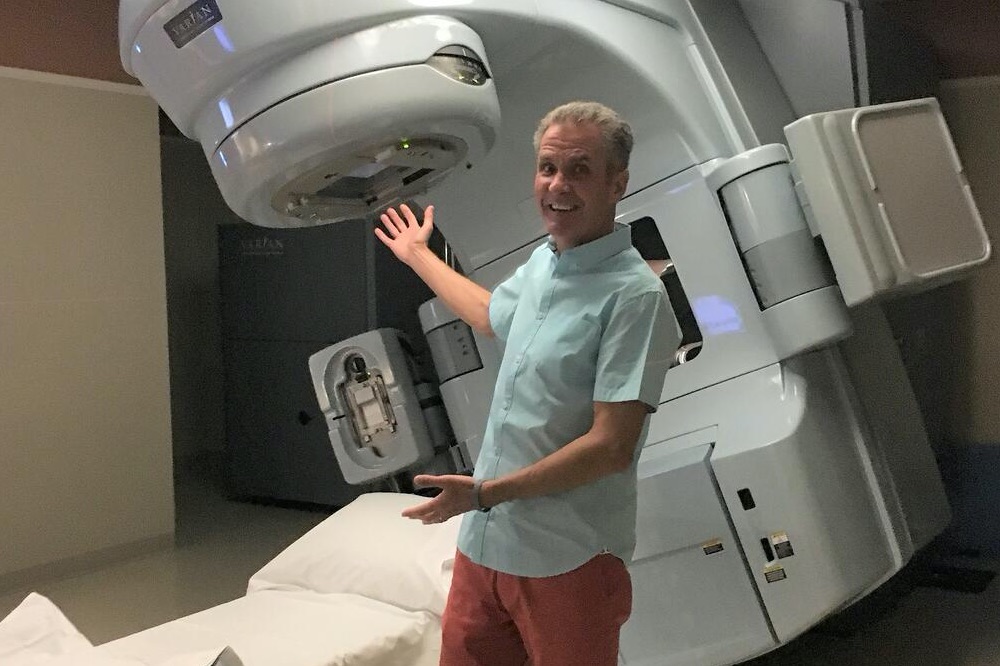It’s important to understand that colorectal cancer is a collective term used to describe cancer that starts in the colon, rectum, or both. These cancers can also be named colon cancer or rectal cancer, depending on where they start:
Colon Cancer
Type of cancer that begins in the large intestine (colon). The colon is the final part of the digestive tract.
Rectal Cancer
Cancer that begins in the rectum— the last several inches of the large intestine. The rectum starts at the end of the final segment of your colon and ends when it reaches the short, narrow passage leading to the anus.
If either of these cancers spread, or metastasize, to the lungs, liver, or any other organ, it is called metastatic colorectal cancer or stage 4. In most cases, the liver is the first to be affected, however, cells may also spread to the lungs, bones, brain, or spinal cord. Most colorectal cancer patients are diagnosed at stage 3 or 4.
Keep in mind that metastatic colorectal cancer is different than recurrent colorectal cancer, which is cancer that returns to the same part of the colon or rectum after treatment, rather than spreading to a different area of the body.
Determining the Extent of Colorectal Cancers
If you have been diagnosed with colon cancer, your doctor will recommend tests to determine if your cancer has spread, and if so, how far. This process is known as staging. Knowing the stage (extent) of your cancer will help your care team at Rocky Mountain Cancer Centers (RMCC):
- Understand how serious your cancer is and your chances of survival
- Plan the best treatment for you
- Identify clinical trials that may be treatment options for you
Some staging tests your doctor could recommend may include imaging procedures such as abdominal, pelvic, and chest CT scans. In many cases, the stage of your cancer may not be fully determined until after colon cancer surgery.
While there are many staging systems, the TNM system, created by the American Joint Committee on Cancer (AJCC), is the most widely used.
TNM stands for:
- T: the size of the tumor and any spread of cancer into nearby tissue
- N: the spread of cancer to nearby lymph nodes
- M: metastasis (spread of cancer to other parts of the body)
In your pathology report, the stage of your cancer will be indicated by Roman numerals that range from 0 to IV. As a general rule, the lower the number, the less the cancer has spread. By stage IV, the cancer is considered advanced and has spread (metastasized) to other areas of the body.
Stages of Colorectal Cancer
Below is a more detailed breakdown of how your doctor will describe colorectal cancer by its stage:
Stage 0 Colorectal Cancer
Also called carcinoma in situ, cancer is found only in the innermost lining of the colon or rectum.
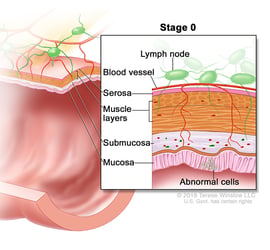
Stage I Colorectal Cancer
In this stage, the tumor has grown into the inner wall of the colon or rectum. The tumor has not grown through the wall.
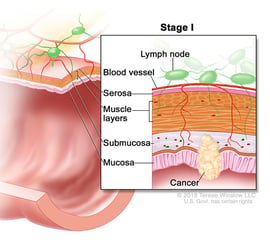
Stage II Colorectal Cancer
Here, the tumor extends more deeply into or through the wall of the colon or rectum. It may have invaded nearby tissue, but cancer cells have not spread to the lymph nodes.
-
Stage IIA: The cancer has grown through the wall of the colon or rectum but has not spread to nearby tissue or to the nearby lymph nodes.
-
Stage IIB: The cancer has grown through the layers of the muscle to the lining of the abdomen, called the visceral peritoneum. It has not spread to the nearby lymph nodes or elsewhere.
-
Stage IIC: The tumor has spread through the wall of the colon or rectum and has grown into nearby structures. It has not spread to the nearby lymph nodes or elsewhere.
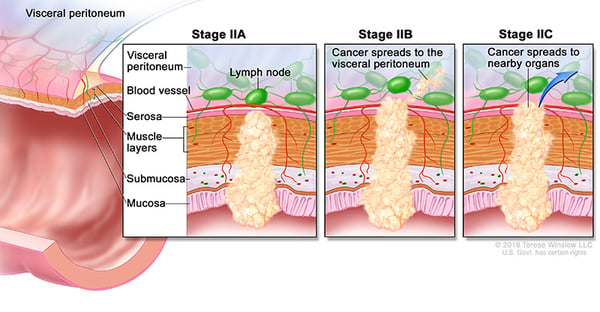
Stage III Colorectal Cancer
Stage III: This stage means the cancer has spread to nearby lymph nodes, but not to other parts of the body.
-
Stage IIIA: The cancer has grown through the inner lining or into the muscle layers of the intestine. It has spread to 1 to 3 lymph nodes or to a nodule of tumor cells in tissues around the colon or rectum that do not appear to be lymph nodes but has not spread to other parts of the body.
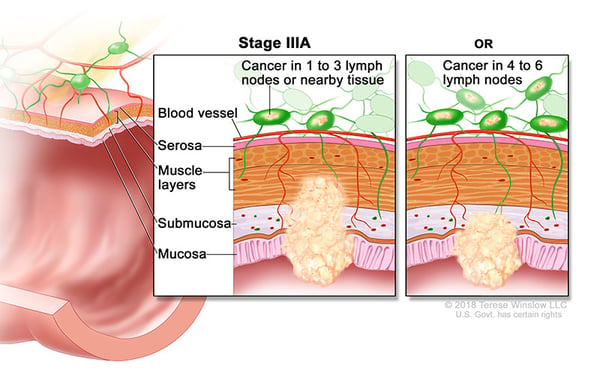
- Stage IIIB: The cancer has grown through the bowel wall or to surrounding organs and into 1 to 3 lymph nodes or to a nodule of tumor in tissues around the colon or rectum that do not appear to be lymph nodes. It has not spread to other parts of the body.
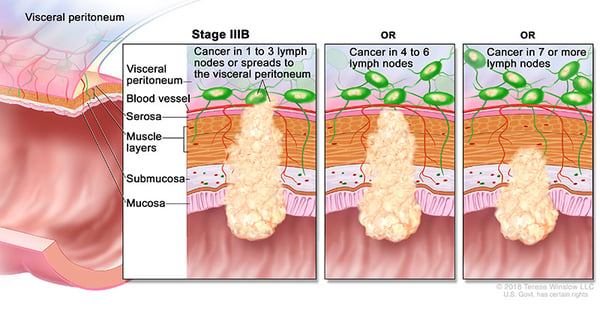
- Stage IIIC: The cancer of the colon, regardless of how deep it has grown, has spread to 4 or more lymph nodes but not to other distant parts of the body.
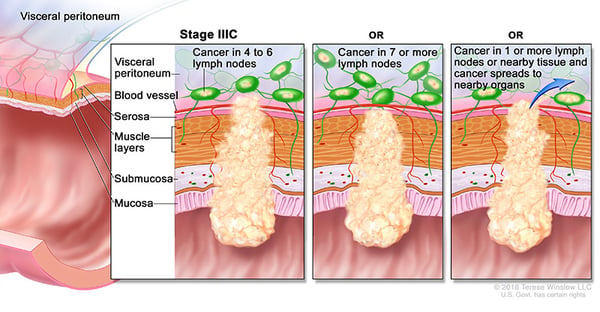
Stage IV Colorectal Cancer
This highest stage means the cancer has spread to other parts of the body, such as the liver or lungs.
- Stage IVA: The cancer has spread to a single distant part of the body, such as the liver or lungs.
- Stage IVB: The cancer has spread to more than 1 part of the body.
- Stage IVC: The cancer has spread to the peritoneum. It may also have spread to other sites or organs.
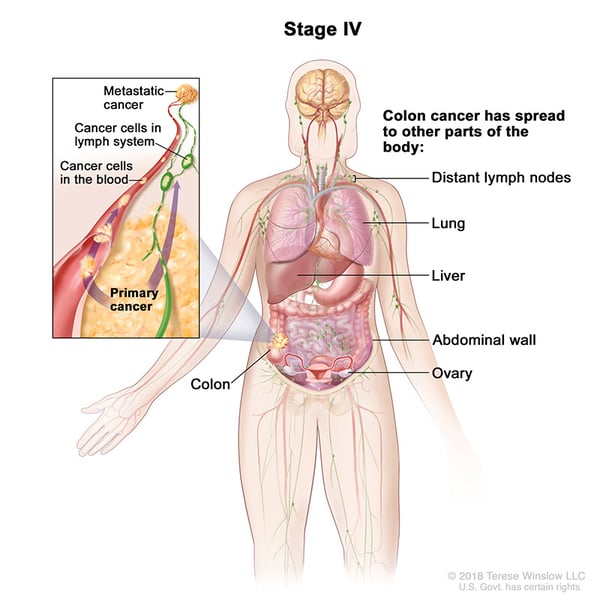
Recurrence
This is cancer that has been treated and has returned after a period of time when the cancer could not be detected. The disease may return in the colon or rectum, or in another part of the body.




